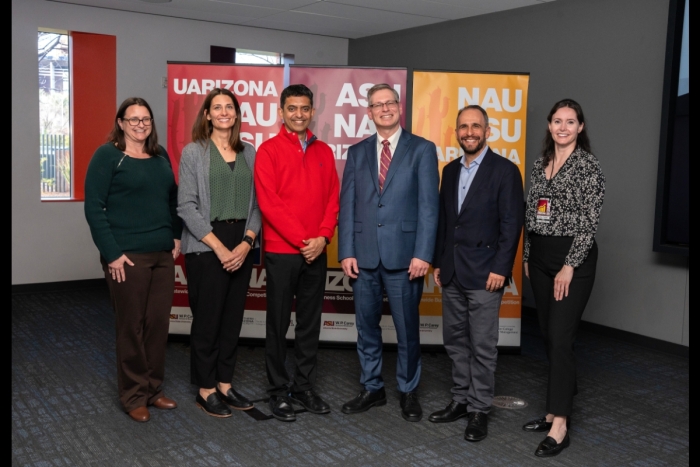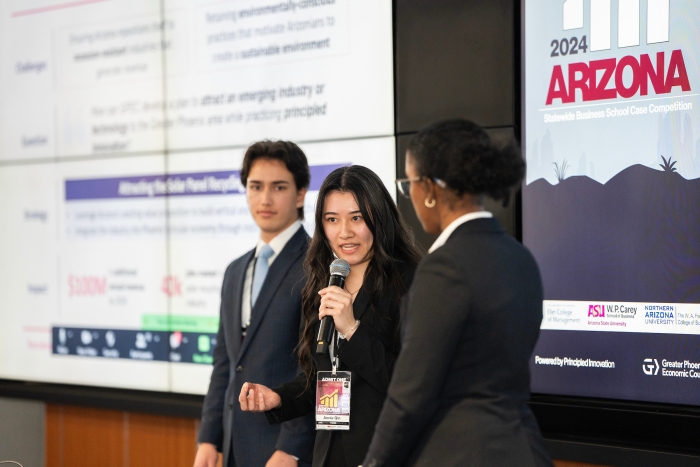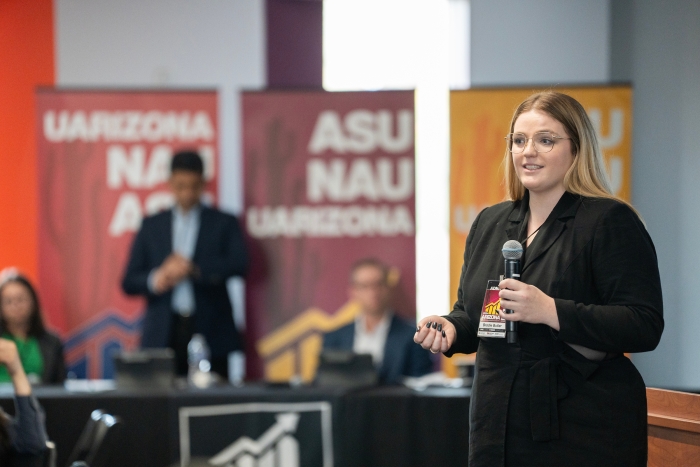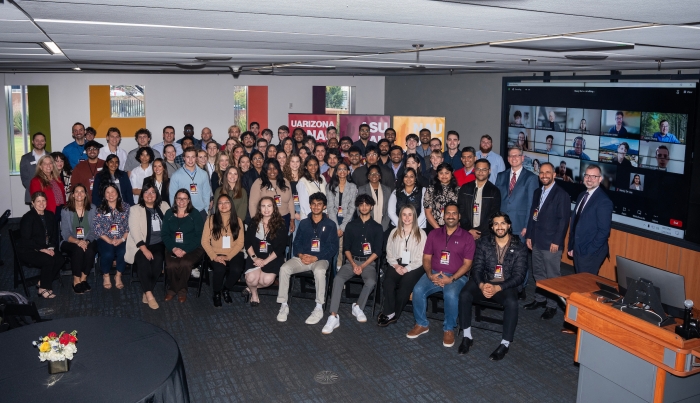Inaugural biz school competition drives collaboration across Arizona universities
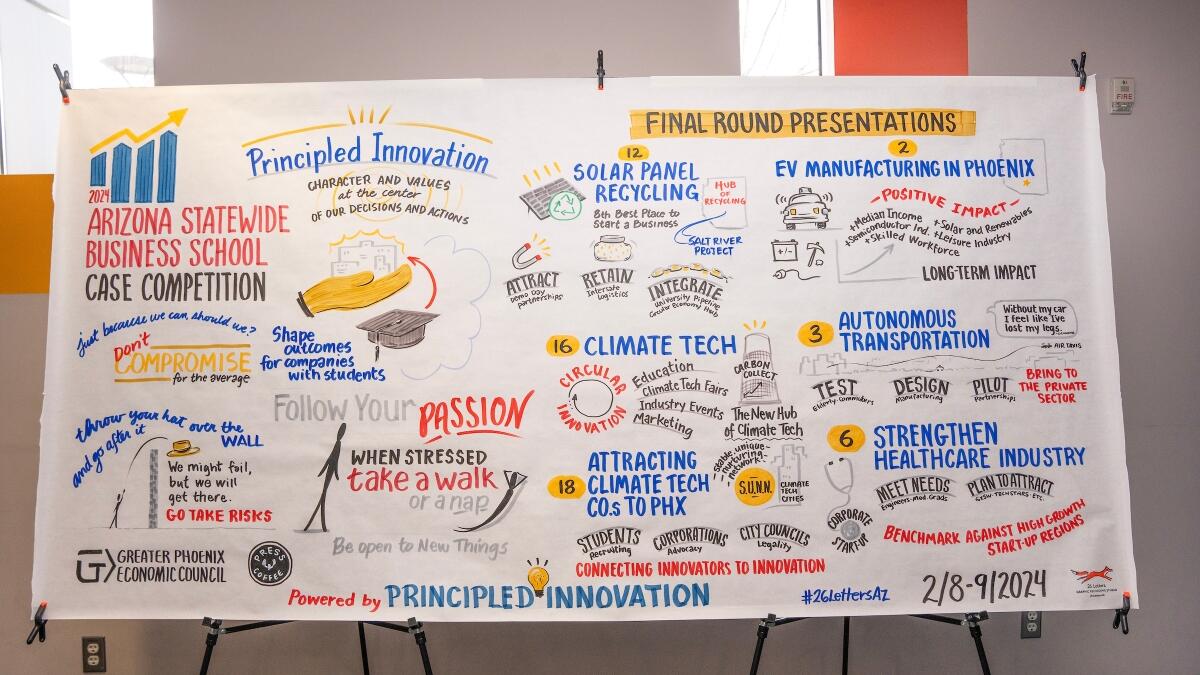
Students at the inaugural Arizona Statewide Business School Case Competition were given five hours to develop a presentation based on a Greater Phoenix Economic Council case study focused on growing businesses in Arizona while incorporating the ASU design aspiration of Principled Innovation. Photo by Shelley Valdez
Business in the state of Arizona today finds itself poised for massive growth, with industries like solar power, autonomous transportation and electric vehicle manufacturing bringing unprecedented economic potential to the region.
Despite mounting enthusiasm, experts agree: What is needed along with this progress is a legion of business professionals prepared to handle the issues that come with it.
Earlier this month, business school students from across the state had the opportunity to put their business acumen, problem-solving skills and teamwork abilities to the test when they came together at Arizona State University to tackle real-world business challenges as part of the inaugural Arizona Statewide Business School Case Competition (ASBSCC).
The competition included attendees from all three state universities’ business schools: ASU’s W. P. Carey School of Business, the Eller College of Management at the University of Arizona (UArizona) and the W. A. Franke College of Business at Northern Arizona University (NAU). Each year, the event will rotate between Tempe, Tucson and Flagstaff.
“The impact of our economy is strengthened when economic leaders, businesses and the community convene to solve problems and create opportunities,” said Kristen Stephenson, senior vice president of research and analytics at the Greater Phoenix Economic Council (GPEC), which provided the case study for the competition.
“Our three state universities are vital to the growth and prosperity of greater Phoenix, and it was incredible to see talented students from across the state come together and construct thoughtful solutions to real-world questions.”
The ASBSCC was created and organized by Dan Gruber, associate dean for teaching and learning at the W. P. Carey School of Business; Sarah Diaz, assistant dean of career and professional development at the Eller College of Management; and Gavin Zhang, professor and department chair of information systems, management, and marketing at the W. A. Franke College of Business, in close partnership with the deans of the three schools and several leaders and teams across W. P. Carey.
The two-day competition kicked off Feb. 8 when 78 students from ASU, UArizona, and NAU were divided into 12 undergraduate and eight graduate teams, and given five hours to develop a presentation based on a GPEC case study focused on growing businesses in Arizona while incorporating the ASU design aspiration of Principled Innovation (PI).
“The idea of PI is that we not only want to grow business and improve the economic prosperity of the region, but we want to do it in the right way,” said Ohad Kadan, the Charles J. Robel Dean of the W. P. Carey School of Business, during his opening remarks. “We want to do it while having a positive impact on our community, on our society, and that is what we are going to ask you to do.”
On Feb. 9, 30 judges from various industries evaluated students on their analysis and understanding of the case problem, the quality of their presentation, their ability to answer the judges’ questions and the creativity, innovation, feasibility and practicality of their proposed solutions. Each member of the winning team received a $500 award and plaque, second-place team members each received a $250 award and plaque, and third-place winners each received a $100 award and plaque.
Presentations focused on climate technology innovation, electric vehicle manufacturing, autonomous transportation and health care.
Undergraduate division winners:
- First place: Annie Qin (ASU); Ethan Hefflin (UArizona); Delaney Chenevert (UArizona); and Aaron Shneyderman (NAU).
- Second place: Madison Reznicki (UArizona); Anthony Guz (ASU); Celeste Mesa (UArizona); and Vaibhav Kotecha (ASU).
- Third place: Shivani Naik (ASU); Dhruv Nair (ASU); Alyssa Chang (UArizona); and Ansel Newman (UArizona).
Graduate division winners:
- First place: Brodie Butler (ASU); Akhilesh Khade (UArizona); Tanner Shumway (ASU); and Robert Powell (NAU).
- Second place: Faseeh Yunus (ASU); Elliot Gatt (ASU); Ryan Soffer (NAU); and Sowmya Yalla (UArizona).
- Third place: Kapil Bhise (ASU); Bitan Mani (UArizona); Sam Bradbury (NAU); and Mansi Patange (UArizona).
"I'm incredibly grateful for the experience ASBSCC provides by bringing together peers from different universities,” said Annie Qin, whose undergraduate team placed first.
Qin’s team focused on climate technology production and recycling in Arizona by proposing a plan for GPEC to bring solar panel recycling technology to the Valley. The team presented a three-phase implementation plan based on attracting, retaining and integrating new companies in the area.
Brodie Butler, an ASU Online student, traveled from California for the competition. Butler’s team presented on the autonomous transportation industry, including ground and air, to show how increased independence through autonomous transportation makes health care more equitable and reduces health disparities and marginalization for older adults and people with disabilities.
“It was a grind, and I am so proud of how we used our strengths in creativity, communication, leadership, teamwork and expertise, provided each other feedback and supported one another,” Butler said.
“This event was created to demonstrate the possibilities for what can happen when we come together and address statewide business challenges by practicing Principled Innovation,” Gruber said.
“I am incredibly grateful to everyone involved in creating and organizing the event — with special thanks to Nancy De Loa, Karla Pace and Tim Debevec — as well as the student participants, our judges, the GPEC team and our deans. It was an inspiring two days that has ignited the opportunities for thoughtful and meaningful collaboration across our schools.”
More Business and entrepreneurship

Boosting entrepreneurship to meet the market's needs
America loves an entrepreneur — the home run king of all businesspeople.And at Arizona State University, we love them, too.Here’s a look at how ASU prepares business students, alumni, development…

ASU Prep program turns students into statisticians through the power of sports
Ask a high school kid if they want to attend a statistics class, and they might give you a blank stare or just laugh.Ask them if they want to go to a professional baseball game and their response…
The business behind the brand
Ask Jennifer Boonlorn ('01 BS in marketing) about the secret to a successful career in the luxury fashion industry and she'll tell you that community building is top of the list."I want to share…


